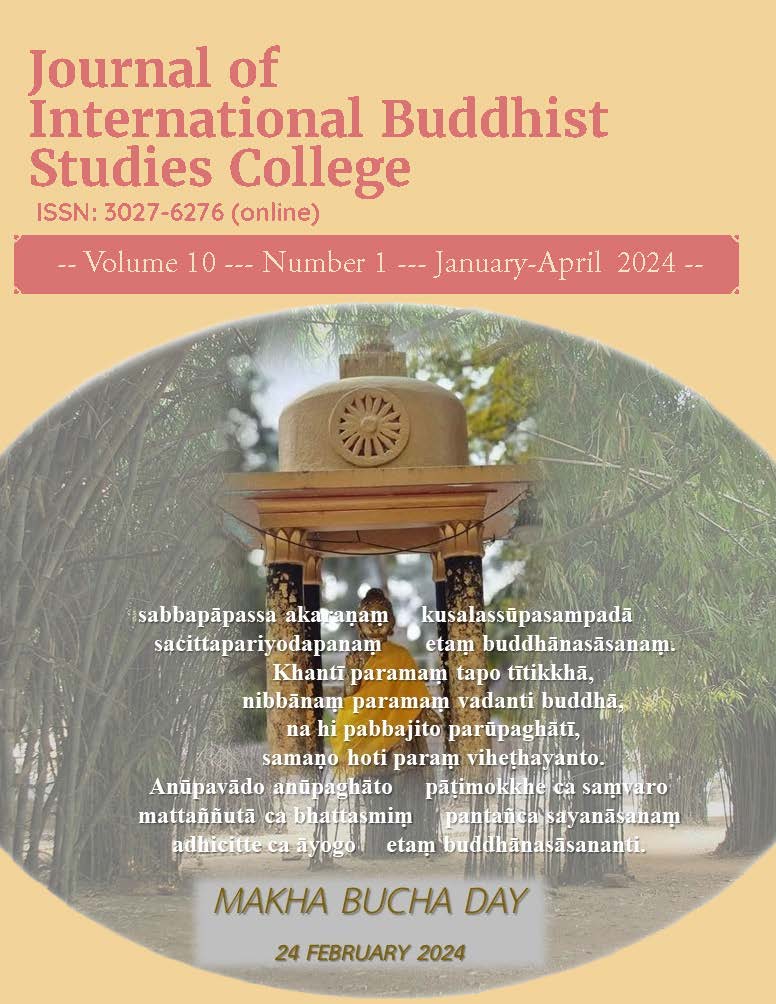The Soft Power of Buddhism: Fostering Social Harmony and Cultural Identity in Thai Society
Main Article Content
Abstract
This article investigates the profound influence of Buddhism as a soft power for fostering social harmony and cultural identity in Thailand. Through historical analyses, sociological perspectives, and contemporary case studies, the study elucidates how Buddhism permeates Thai society, impacting governance, familial relationships, and communal rituals. The exploration of Buddhist teachings, ethical values, and institutional frameworks underscores the pivotal role of the Sangha (monastic community) in promoting solidarity, resilience, and moral integrity among Thai citizens. Additionally, the report examines the dynamic interplay between Buddhism and socio-political dynamics, addressing the challenges and opportunities for preserving Buddhist traditions amidst rapid social change and globalization. By illuminating the connections between religion, culture, and social cohesion, this study provides insights into the enduring significance of Buddhism as a unifying force in Thai society.
Article Details
The Journal of TCI is licensed under a Creative Commons Attribution-NonCommercial-NoDerivatives 4.0 International (CC BY-NC-ND 4.0) licence unless otherwise stated. Please read our Policies page for more information on Open Access, copyright and permissions.
References
Arphattananon, T. (2020). Religion, ideology and education in Thailand. In Religious Education in Asia (pp. 90-108). Routledge.
Bettiza, G., & Henne, P. S. (2023). Religious Soft Power. The Geopolitics of Religious Soft Power: How States Use Religion in Foreign Policy, 270.
Borup, J. (2018). Prosperous Buddhism, prosperity Buddhism, and religious capital. Numen, 65(2-3), 256-288. https://doi.org/10.1163/15685276-12341497
Borup, J. (2020). Who owns religion? intersectionality, identity politics, and cultural appropriation in postglobal Buddhism. Numen, 67(2-3), 226-255. https://doi. org/10.1163/15685276-12341574
Craig, S. R., Gerke, B., & Sheldon, V. (2020). Sowa rigpa humanitarianism: local logics of care within a global politics of compassion. Medical Anthropology Quarterly, 34(2), 174-191. https://doi.org/10.1111/maq.12561
Gao, J., Fan, J., Wu, B. W., Halkias, G. T., Chau, M., Fung, P. C. W., Chang, C., Zhang, Z., Hung, Y. S. & Sik, H. (2017). Repetitive religious chanting modulates the late-stage brain response to fear- and stress-provoking pictures. Frontiers in Psychology, 7. https://doi.org/10.3389/fpsyg.2016.02055
Gupta, R. K. and Verma, A. K. (2021). The spread of Buddhism and peace in Southeast Asia. Heritage of Nusantara: International Journal of Religious Literature and Heritage, 10(2), 220-247. https://doi.org/10.31291/hn.v10i2.627
Karimova, N. E. (2022). From the history of Buddhism in Thailand. Builders of the future, 2(02), 250-257.
Khobragade, V. (2022). Buddhism: India's Soft Power Diplomacy. SOUTH INDIA JOURNAL OF SOCIAL SCIENCES, 20(2), 70-82.
Laskar, R. H. (2024, July 1) Soft power: India sends Buddha relics to Thailand to counter Chinese efforts. https://www.hindustantimes.com/india-news/soft-power-india-sends -buddha- relics-to-thailand-to-counter-chinese-efforts-101709553813118.html
Mahaseth, H., & Khatoon, S. (2024). Enhancing India’s soft power through the prism of Buddhism. Hindustan Times.
McGovern, N. (2022). Buddhist practice in Southeast Asia. In P. Arai & K. Trainor. (eds.). The Oxford Handbook of Buddhist Practice, (pp. 37-52). Sheridan Books, Inc. https://doi. org/10.1093/oxfordhb/9780190632922.013.2
Ocha, W. (2023). Buddhism, gender, and sexualities: queer spiritualities in Thailand. Equality, Diversity and Inclusion: An International Journal, 42(5), 685-705.
Pham, T. H., & Nikolaeva, E. (2021). The soft power of India Buddhism for sustainable development in North East Asia. In E3S Web of Conferences (Vol. 258, p. 05003). EDP Sciences.
Ponka, T. I., Dzhanaeva, A. E., & Jielin, Z. (2017). Buddhism as a resource of “soft power” of China. Vestnik RUDN. International Relations, 17(2), 290-300.
Prabnok, P. (2018). The Cultural Identity Construction of Temples for Tourism. European Journal of Social Science Education and Research, 5(2), 19-26.
Raina, A. R., & Singh, A. (2023). Impact of Buddhist thoughts on Cultural Nationalism of India. Sprin Journal of Arts, Humanities and Social Sciences, 2(01), 01-07.
Rau's IAS. (2023, July 1). Buddhism as a tool of Soft Power. https://compass.rauias.com/current-affairs/buddhism-as-a-tool-of-soft-power/
Shmushko, K. (2022). Buddhism, an Urban Village and Cultural Soft Power: An Ethnography of Buddhist Practitioners in Wutong. Entangled Religions, 13(1). https://doi.org/10. 46586/er.13.2022.9709
Srichampa, S. (2015). India and Thailand: Soft Power Ties. Humanities, Arts and Social Sciences Studies (Former Name Silpakorn University Journal of Social Sciences, Humanities, And Arts), 121-150.
Srinok, S., Wongsuwan, N., Buppapan, S., Widesbrommakun, P., Thongdee, V., & Ruangsan, N. (2021). Buddhism and Thai educational system. Linguistics and Culture Review, 5(S1), 1335-1342. https://doi.org/10.21744/lingcure.v5ns1.1635
Tangpatomwong, N. (2021). The Buddhist Way of Life: Intercultural Communication of Thailand and India. Journal of Humanities and Social Sciences Prince of Songkla University, 16(1), 127–158.
The Government Public Relations Department. (2024 July 1). Thailand Unveils Soft Power Strategy for Global Reach. https://thailand.prd.go.th/en/content/category/detail/ id/52/iid/285581
Virunanont, P. (2020). Traditional intricate paper cutting techniques of Southern Thailand: background, beliefs, and cultural animation of Thai Buddhist culture. Manusya: Journal of Humanities, 23(1), 60-85.
Winichakul, T. (2015). Buddhist apologetics and a genealogy of comparative religion in Siam. Numen, 62(1), 76-99. https://doi.org/10.1163/15685276-12341356
Yulianti, Y. (2022). The birth of Buddhist organizations in modern Indonesia, 1900–1959. Religions, 13(3), 217. https://doi.org/10.3390/rel13030217


